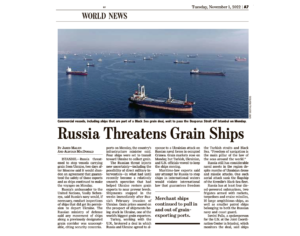Tariffs imposed by the Trump administration collected an estimated $958 million in revenue from selected agricultural inputs from February to October of 2025, according to North Dakota State University's monthly…
Russia Threatens Ships Sailing Ukraine’s Grain Export Corridor, Calls Movement “Unacceptable”
Jared Malsin and Alistair MacDonald reported in today’s Wall Street Journal that, “Russia threatened to stop vessels carrying grain from Ukraine, two days after Moscow said it would abandon an agreement that guaranteed the safety of those exports and as ships continued to make the voyages Monday anyway.

“Russia’s ambassador to the United Nations, Vasily Nebenzya, said Russia’s navy would, if necessary, conduct inspections of ships that did get its permission to depart Ukraine. The Russian Ministry of Defense said any movement of ships along a previously designated grain corridor was unacceptable, citing security concerns.
“The threat came as merchant ships continued to pull in and out of Ukraine’s grain-exporting ports along the Black Sea, just days after Russia suspended its participation in a U.N.-brokered deal to allow Ukrainian grain exports. Twelve ships carrying grain departed from Ukrainian ports on Monday, the country’s infrastructure minister said. Four ships were set to transit toward Ukraine to collect grain.”
The Journal writers explained that,
The Russian threat injects new uncertainty—including the possibility of direct military intervention—in what had until recently become a relatively smooth operation that had helped Ukraine restore grain exports to near-prewar levels.
Bloomberg News reported yesterday that, “Russia warned that the security of ships sailing Ukraine’s grain-export corridor cannot be guaranteed without additional conditions, increasing risks for Black Sea trade after Russia halted involvement in a key accord.
“‘The movement of ships along the security corridor is unacceptable,’ Russia’s Defense Ministry said in a statement Monday, repeating unsubstantiated claims that Ukraine used the corridor for military purposes. The ministry emphasized that Russia hasn’t abandoned the deal but just suspended its involvement.
“Ukraine must guarantee that there are no threats to civilian ships or Russian vessels, President Vladimir Putin said later during a press briefing.”
The Bloomberg article added that, “The comments follow repeated criticism from Russian officials. Earlier, Ukraine said that Russia struck two civilian tugboats involved in transporting a grain barge near Ochakiv, to the east of the UN-agreed export corridor.”
The @UNReliefChief, Martin Griffiths, and the of @UNCTAD, @RGrynspan, briefed the Security Council in the wake of Russia's decision to suspend participation in the Black Sea Grain Initiative.https://t.co/ZH0DBzNf3x
— UN News (@UN_News_Centre) November 1, 2022
Meanwhile, Bloomberg writer Megan Durisin reported yesterday that, “Deliveries of Ukrainian crops to ports are grinding to a halt, as the agricultural sector becomes more circumspect in the face of further Russian disruption, according to the Ukrainian Agribusiness Club.”
“‘We don’t have a clear situation and a clear view what will happen in the next days,’ Roman Slaston, chief executive of the club. ‘The grain operators and the grain port-terminal operators see this uncertainty. The flow of grain to the seaports – it’s slowed down definitely.'”
Russia’s suspension of its participation in @UN Black Sea Grain Initiative obstructs export of much needed grain to address the global food crisis. EU urges Russia to reverse its decision & supports UNSG call for extension of the initiative beyond November https://t.co/U0sYNqaGmQ
— Josep Borrell Fontelles (@JosepBorrellF) October 31, 2022
And Reuters writer Pavel Polityuk reported yesterday that, “Ukraine can export no more than 3.5 million tonnes of farm goods a month if its Black Sea ports are blocked, analyst APK-Inform said on Monday after Russia suspended its participation in a U.N. programme to safely export grain from the war zone.”
Also yesterday, Reuters writers Jonathan Saul and Carolyn Cohn reported that, “Lloyd’s of London insurer Ascot is suspending writing cover for new shipments using the Ukrainian grains corridor in the Black Sea until it has more clarity about the situation there, a senior official said on Monday.”
“‘From today we are pausing on quoting new shipments until we better understand the situation,’ Ascot head of cargo Chris McGill told Reuters. ‘Insurance that has already been issued still stands.'”
Reuters writer Humeyra Pamuk reported yesterday that, “Russia’s halting of its participation in the United Nations-brokered Black Sea Grain Initiative is having ‘immediate, harmful impacts’ on global food security and food prices have risen on uncertainty around the deal, U.S. State Department spokesperson Ned Price said on Monday.”
While Dow Jones writer Yusuf Khan reported yesterday that, “Grain markets lifted at the start of the week after Russia said it was suspending its participation in the Black Sea Grain initiative, weeks before the deal was due to be renewed.
“Wheat markets soared on Monday morning after Russia’s announcement over the weekend, and the movements of the grain deal in the coming days will likely determine how markets progress.”
And Bloomberg writers Megan Durisin, Aine Quinn, and Daryna Krasnolutska reported yesterday that, “Wheat in Chicago settled 6.4% higher at $8.8225 a bushel, after earlier jumping as much as 7.7%. Corn climbed 1.6% and soybean oil rose 2%.
“The latest uncertainty comes as the International Grains Council estimates global grain stockpiles at an eight-year low this season. Supply is coming under increasing pressure, most recently as drought in Argentina and heavy rain in Australia hamper wheat crops nearing harvest there.”
Elsewhere, Reuters News reported today that, “Ukrainian President Volodymyr Zelenskiy said on Monday that his country would continue exporting grain from its Black Sea ports under a U.N. programme despite Russia’s pullout because the shipments offered stability to world food markets.”
More broadly, Reuters writer Pavel Polityuk reported yesterday that, “Ukraine’s grain exports fell to 4.22 million tonnes in October 2022 from 5.05 million tonnes in the same month of the previous year, the agriculture ministry said on Monday.”
And a separate Reuters article today by Polityuk indicated that, “Ukrainian farms have sown 3.5 million hectares of winter wheat as of Nov. 1, or 87% of the expected area, compared with 6.1 million hectares sown on the same date in 2021, agriculture ministry data showed on Tuesday.”





